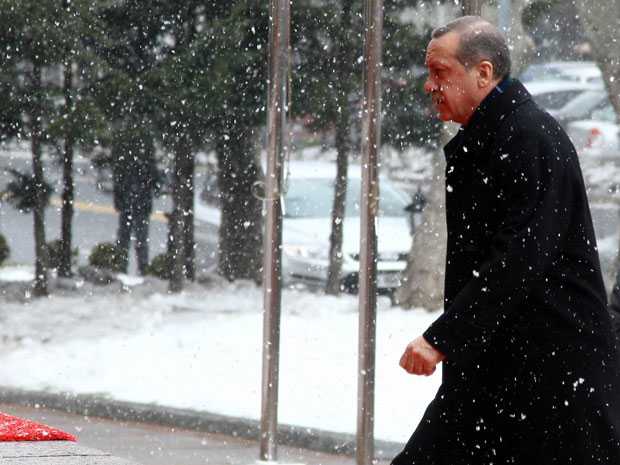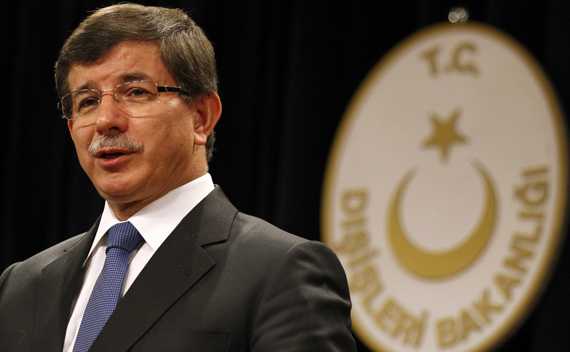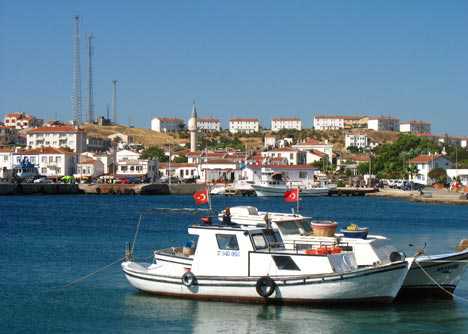By Fulya Ozerkan
ANKARA — Prime Minister Recep Tayyip Erdogan’s comment that his government wants to “raise a religious youth” has touched a nerve in society, fuelling debates over an alleged “hidden agenda” to Islamise secular Turkey.

Turkish Prime Minister Recep Tayyip Erdogan (C) arrives for a meeting in Ankara on February 9, 2012
“We want to raise a religious youth,” said Erdogan, himself a graduate of a clerical school and the leader of the Islamist-rooted Justice and Development Party (AKP), during a parliamentary address last week.
“Do you expect the conservative democrat AK Party to raise an atheist generation? That might be your business, your mission, but not ours. We will raise a conservative and democratic generation embracing the nation’s values and principles,” he added.
Erdogan’s remarks drew strong criticism from the staunchly secular Republican People’s Party (CHP) founded by Mustafa Kemal Ataturk, with its leader calling him a “religion-monger.”
“It is a sin to garner votes over religion. You are not religious but a religion-monger,” said Kemal Kilicdaroglu, accusing Erdogan of polarising the country by touching its faultlines.
“I’m asking the prime minister: what can I do if I don’t want my child to be raised as religious and conservative?” wrote prominent liberal commentator Hasan Cemal in Milliyet daily.
“If you are going to train a religious and conservative generation in schools, what will happen to my child?” he asked.
Columnist Mehmet Ali Birand also criticised Erdogan this week in an article titled, “The race for piety will be our end.”
“What does it mean, really, that the state raises religious youth? Is this the first step towards a religious state?” he wrote in Hurriyet Daily News.
Erdogan must explain what he meant, otherwise a dangerous storm may erupt and go as far as fights about being religious versus being godless, he argued.
Neither religious nor political uniformity can be imposed on Turkey given regional, ethnic and sectarian diversity in the country, wrote Semih Idiz in Milliyet daily on Tuesday.
He said millions of people “have subscribed to secular lifestyles” even before the republic.
Erdogan’s AKP has been in power since 2002 and won a third term with nearly 50 percent of the vote in the 2011 elections, securing 325 seats in the 550-member parliament.
But since then the influence of the military, considered as guardian of secularism, has waned.
Dozens of retired and active army officers, academics, journalists and lawyers have been put behind bars in probes into alleged plots against Erdogan’s government.
Critics accuse the government of launching the probes as a tool to silence opponents and impose authoritarianism.
Secular quarters argue Erdogan’s conservative government is also step by step imposing religion in every aspect of life, saying many restaurants already refuse to serve alcohol during Ramadan.
They also criticise recent changes to legislation under which religious school graduates will now be able to access any university branch they like, while in the past they had only access to theology schools.
Birand expressed fears that the changes would not be confined to this and would lead to censorship in television broadcasts.
The Turkish television watchdog RTUK “will restrict all kissing scenes; they will confuse pornography with explicit broadcast and all television screens will be made pious,” he added.
“Then will come religious foundations. After them, it will be municipalities. All kinds of Koran teaching courses, legal or illegal, will mushroom.”
Observers say Erdogan’s message contradicts what he had said during a recent tour of Arab Spring countries, in September.
“As Recep Tayyip Erdogan I am a Muslim but not secular. But I am a prime minister of a secular country. People have the freedom to choose whether or not to be religious in a secular regime,” he said in an interview with an Egyptian TV, published by Turkish daily Vatan.
“The constitution in Turkey defines secularism as the state’s equal distance to every religion,” he said in remarks that provoked criticism from the Muslim Brotherhood in Egypt.
Postmedia News
via Recep Tayyip Erdogan sparks furor in Turkey by saying he wants to ‘raise a religious youth’ | News | National Post.





